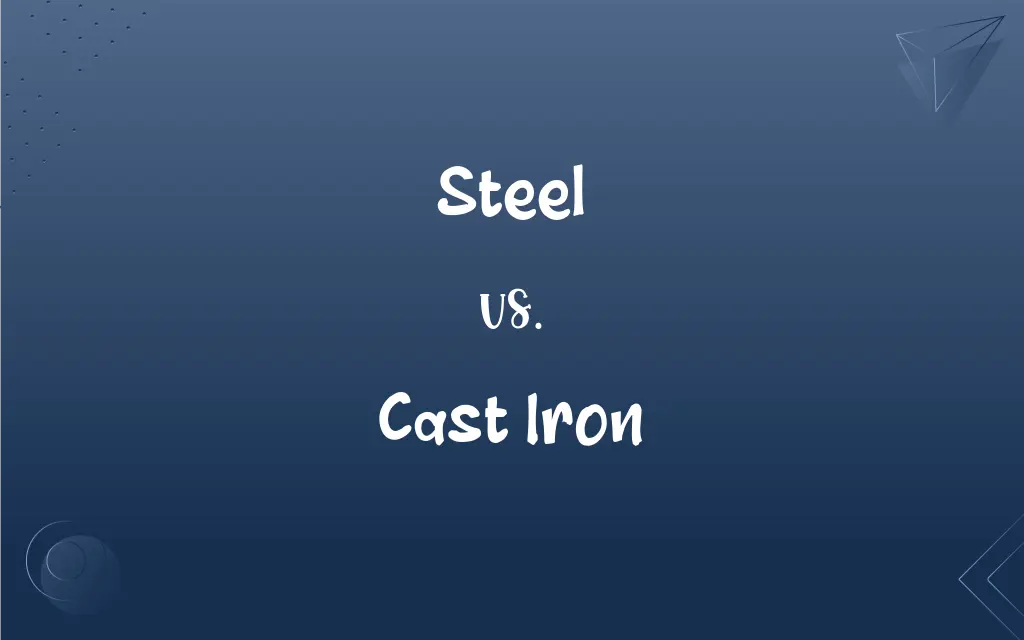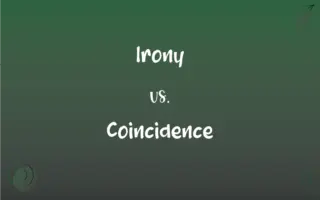Steel vs. Cast Iron: What's the Difference?
Edited by Janet White || By Harlon Moss || Published on November 29, 2023
Steel is an alloy of iron with carbon and other elements; cast iron contains higher carbon content and is less malleable.

Key Differences
Steel is primarily an alloy of iron and carbon, but its composition can include other elements to achieve specific properties. It's versatile and can be found in various forms, such as stainless steel, carbon steel, and alloy steel, to name a few. Steel's strength and flexibility make it a preferred material for numerous applications, from building infrastructure to creating household tools.
Cast iron, on the other hand, is a type of iron-carbon alloy with a carbon content higher than 2%. Because of its elevated carbon content, cast iron is less ductile than steel and is more brittle. One noticeable characteristic of cast iron is its excellent heat retention, which is why it's a popular material for cookware like frying pans and dutch ovens.
While both steel and cast iron originate from iron, their differing carbon content and additional alloying elements give them unique properties. Steel, being more ductile, can be rolled into sheets, drawn into wires, or forged into various shapes. Cast iron's brittleness means it's less suited for these applications but is exceptional for casting, hence its name.
Moreover, the corrosion resistance of these two materials is distinct. Stainless steel is well-known for resisting rust, while cast iron can rust easily if not properly seasoned or coated. However, the seasoning of cast iron cookware can create a natural non-stick surface, which is cherished by many culinary enthusiasts.
In terms of weight, cast iron tends to be heavier than steel, given equal volume. This weight contributes to its sturdy nature, making cast iron items long-lasting if cared for correctly, whereas steel's durability stems more from its structural strength and flexibility.
ADVERTISEMENT
Comparison Chart
Carbon Content
Varies but generally lower than 2%
Typically higher than 2%
Ductility
More ductile and malleable
More brittle
Typical Uses
Infrastructure, tools, appliances
Cookware, decorative pieces, engine blocks
Corrosion Resistance
Can be high in certain types like stainless steel
Can rust easily if not seasoned or coated
Weight
Lighter given equal volume
Heavier given equal volume
ADVERTISEMENT
Steel and Cast Iron Definitions
Steel
A strong, hard, magnetic material.
The steel beam supports the building's weight.
Cast Iron
Iron-carbon alloy with more than 2% carbon content.
The cast iron skillet retains heat perfectly.
Steel
An alloy of iron and carbon with varying elements.
The bridge is made of reinforced steel.
Cast Iron
Brittle and less malleable than steel.
The cast iron fence is heavy but decorative.
Steel
Known for its high tensile strength.
Steel cables hold the suspension bridge in place.
Cast Iron
Often used for cookware and heavy-duty items.
She purchased a cast iron pot for stews.
Steel
A versatile material used in construction and tools.
He purchased a steel ladder for home repairs.
Cast Iron
A material known for excellent heat retention.
Many chefs prefer cast iron pans for even cooking.
Steel
Can be stainless, carbon, or alloyed for specific properties.
Stainless steel cutlery doesn't rust easily.
Cast Iron
Can rust but can be seasoned for protection.
The cast iron pan was seasoned to prevent rusting.
Steel
A generally hard, strong, durable, malleable alloy of iron and carbon, usually containing between 0.2 and 1.5 percent carbon, often with other constituents such as manganese, chromium, nickel, molybdenum, copper, tungsten, cobalt, or silicon, depending on the desired alloy properties, and widely used as a structural material.
Cast Iron
Made of cast iron.
Steel
Something, such as a sword, that is made of steel.
Cast Iron
Rigid; inflexible
A cast-iron rule.
Steel
A quality suggestive of this alloy, especially a hard, unflinching character.
FAQs
Why is cast iron used for cooking pans?
Cast iron offers excellent heat retention and distribution.
Can steel rust?
Yes, but certain types, like stainless steel, resist rust.
Why is steel used in construction?
Steel's strength, ductility, and tensile properties make it ideal for construction.
What is the main component in both steel and cast iron?
Both steel and cast iron are primarily made of iron.
Why is cast iron brittle?
The high carbon content in cast iron contributes to its brittleness.
Can steel be magnetic?
Yes, certain types of steel can be magnetic.
Why is cast iron often black?
The black color is from seasoning and the material's natural hue.
Do all steel types contain the same elements?
No, steel can have various elements depending on its type (e.g., stainless, carbon).
Which is more expensive, steel or cast iron?
Costs vary based on type, quality, and application. Typically, specialized steels are more expensive.
Can you make a knife out of cast iron?
Technically, yes, but it would be brittle. Steel is preferred for knives.
Which lasts longer, steel tools or cast iron tools?
Lifespan varies based on use and maintenance, but steel tools tend to endure wear better.
Can you weld cast iron like steel?
Welding cast iron requires specific techniques, different from steel.
Is stainless steel actually stain-free?
Stainless steel resists staining and corrosion but isn't entirely stain-proof.
Is cast iron always heavy?
Generally, cast iron items are heavier than steel counterparts due to density.
Is cast iron safe for cooking?
Yes, seasoned cast iron is safe and even adds a small amount of iron to food.
What gives steel its strength?
The combination of iron, carbon, and other alloying elements.
What is carbon steel?
It's steel where the main alloying element is carbon.
How can you prevent cast iron from rusting?
Seasoning with oil and proper storage can prevent rust.
How do you season a cast iron skillet?
By applying a thin layer of oil and heating it until it smokes, then cooling.
How do you clean cast iron cookware?
Gently scrub using minimal soap, rinse, dry thoroughly, and apply a light oil layer.
About Author
Written by
Harlon MossHarlon is a seasoned quality moderator and accomplished content writer for Difference Wiki. An alumnus of the prestigious University of California, he earned his degree in Computer Science. Leveraging his academic background, Harlon brings a meticulous and informed perspective to his work, ensuring content accuracy and excellence.
Edited by
Janet WhiteJanet White has been an esteemed writer and blogger for Difference Wiki. Holding a Master's degree in Science and Medical Journalism from the prestigious Boston University, she has consistently demonstrated her expertise and passion for her field. When she's not immersed in her work, Janet relishes her time exercising, delving into a good book, and cherishing moments with friends and family.






































































